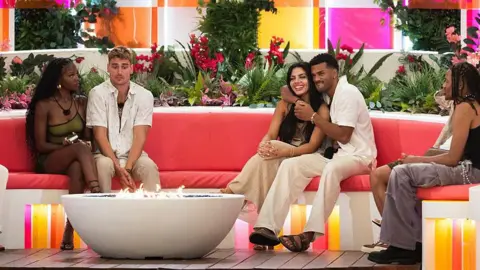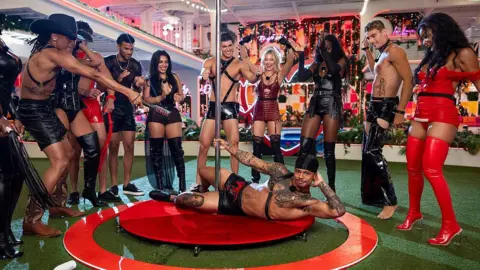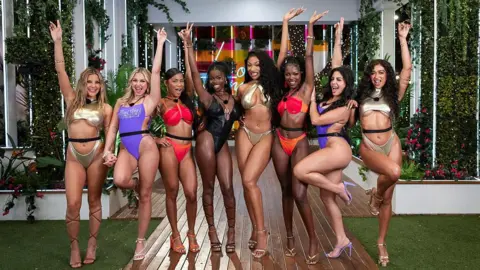What Love Island USA can learn from the UK show's own tragedies
 Peacock via Getty Images
Peacock via Getty ImagesLove Island USA - a spinoff of the UK reality series - is having its most-watched season yet. But its newfound popularity has come with a dark side.
Contestants have been relentlessly cyberbullied on social media, so much so that the show aired a statement during a recent episode with a plea for viewers to halt the harassment. Its host Ariana Madix echoed the sentiment, asking viewers to rethink their posts and how they could impact the cast.
The show - which places everyday men and women in a villa in Fiji to compete and find love - often helps contestants secure millions of social media followers, brand deals and appearance requests.
But the downsides of overnight fame have been well-documented since the show's start 10 years ago in the UK, with some contestants complaining about depression, anxiety and relentless scrutiny. Two contestants died by suicide after appearing on the show, prompting the British government to launch an inquiry into reality television.
The show's producers say they've learned from the reality franchise's years of success how to better support cast and crew. But psychology experts who have worked with reality TV shows say it's an uphill battle.
 Peacock via Getty Images
Peacock via Getty ImagesBehavioural psychologist Jo Hemmings, who has worked with reality TV productions including Big Brother, said the last five years have seen a lot of positive changes in the UK to address welfare concerns - but those strides haven't been as evident in the US.
"I don't think duty of care has evolved as far in the US as it has in the UK," she told the BBC. "Maybe there isn't the same level of welfare, support or transparency. I also wonder that with increased political polarisation in the US, the cyber-bullying and threats may be more intense and widespread."
She said it's about achieving a balance when working on a reality show. The core of many of these shows is outrageous emotional outbursts, sexual behaviour, aggressive insults and confrontations.
"Producers want excitement and jeopardy," she said, but on-set psychologists are ensuring "stability and healthy behaviours".
Love Island, which has run iterations in more than 20 countries, says it offers contestants support before, during and after production, and continues to adjust its mental health offerings to meet changing needs.
On the USA version, ITV America, which produces the show, employs a duty of care representative, two on-site psychologists and a welfare manager that helps islanders as a "non-producer voice" in the villa. Throughout filming, all cast members have an appointed psychologist at the villa - and check ins can be initiated by an islander, as cast members are called on the series, or the doctor.
Before they are cast on the show, each contestant goes through a lengthy vetting by a psychologist. Contestants are also briefed about negative press, social media interactions and public perceptions.
But this mental health awareness has come from some hard lessons. As the show gained popularity in the UK, some complained about depression or anxiety after appearing as part of the cast. Several have spoken out about thoughts about taking their own lives in the aftermath.
The suicides of former Love Island UK contestants Sophie Gradon and Mike Thalassitis in 2018 and 2019 prompted questions about how and how well participants are helped.
"You can earn a lot of money if that's what you want to do, but really you need to look at the bigger picture and think in five, six, 10 years' time, you're always going to be pretty much known for being on a reality TV show," said Zara Holland, who competed on Love Island in 2016 in the UK.
"It was a really hard time for me. And if I could turn back time, I really wish I'd never gone on the show," she told BBC's Newsbeat.
Social media can act as a double-edged sword for contestants. Dr Jamie Huysman, who has advised productions on mental health care for more than 20 years, noted it has "made it hell" for some. "It has truly disassociated us from the impact of our words."
Contestants want fame - but they're not the only ones who feel a rush by getting likes and followers online. Average viewers on social media are also chasing that same gratification when they make memes or posts that become popular, and they are often incentivised to be critical, he says.
Ms Hemmings said psychologists can encourage people to ignore those criticising them online, but it's difficult.
"The public can be fickle and harsh," she said. "They need to remember that contributors are young and ambitious, but could be their siblings, brothers, sisters or children."
She noted that overnight fame can lead to a cascade of issues for contestants, which can be overwhelming.
"They yearn for it, but it brings unwelcome scrutiny," she said. "Their pasts are dissected. Exes come out of the woodwork to sell their stories, and everything they do or say is open to criticism."
Another complication is that "very few reality stars go onto successful media careers - most struggle or fade away". But having a taste of popularity can make it difficult to go back to their old lives.
Season 7, which is still airing, has become the series' most-watched season since it was launched in the US in 2019. Sports bars are hosting watch parties, celebrities are spoofing viral moments online - Grammy-winner Megan Thee Stallion even appeared on an episode this season and gushed over her obsession with the show.
The show's popularity in the US has spurred a spin-off dubbed "Beyond the Villa", which is set to air next month and follow Season 6 Islanders as they navigate life in Los Angeles after the show.
But that success has also led to a rise in negative comments about the cast this season, who have been relentlessly criticised over their appearances and actions. The show broadcast a message this week in the middle of an episode: "The keyword in Love Island is… Love. We love our fans. We love our Islanders. We don't love cyberbullying, harassment or hate."
It followed a public plea from host Ariana Madix: "Don't be contacting people's families. Don't be doxing people. Don't be going on Islanders' pages and saying rude things."
Love Island USA's producers did not say whether added mental health precautions would be taken after this season - but noted they review and reassess such measures continually.
 Peacock via Getty Images
Peacock via Getty ImagesMembers of the cast do not have access to their cell phones or social media while on the island, but their friends and family have been responding to some of the harassment - including those who know contestant Huda Mustafa, a mother whose relationship with fellow Islander Jeremiah Brown has been heavily scrutinised online this season.
The show has routinely defended itself and its cohesive psychological support system. Similar critiques have been made toward reality TV production broadly, boiling over in 2023 when reality star Bethenny Frankel of the Housewives franchise sounded off on the treatment of reality stars, dubbing it a "reality reckoning".
"Networks and streamers have been exploiting people for too long," she said, arguing those who appear on reality programmes should be unionised.
The calls were followed by several lawsuits challenging "Love Is Blind," the "Real Housewives" franchise and "Vanderpump Rules" - where Ms Madix rose to fame - over the treatment of the shows' casts.
Suzie Gibson, a senior lecturer in English at Charles Sturt University, compared reality TV stars to "modern-day gladiators, battling for love, fame and Instagram followers".
"Audiences can live vicariously through their favourites, while hoping for others' dismissal or ridicule."
